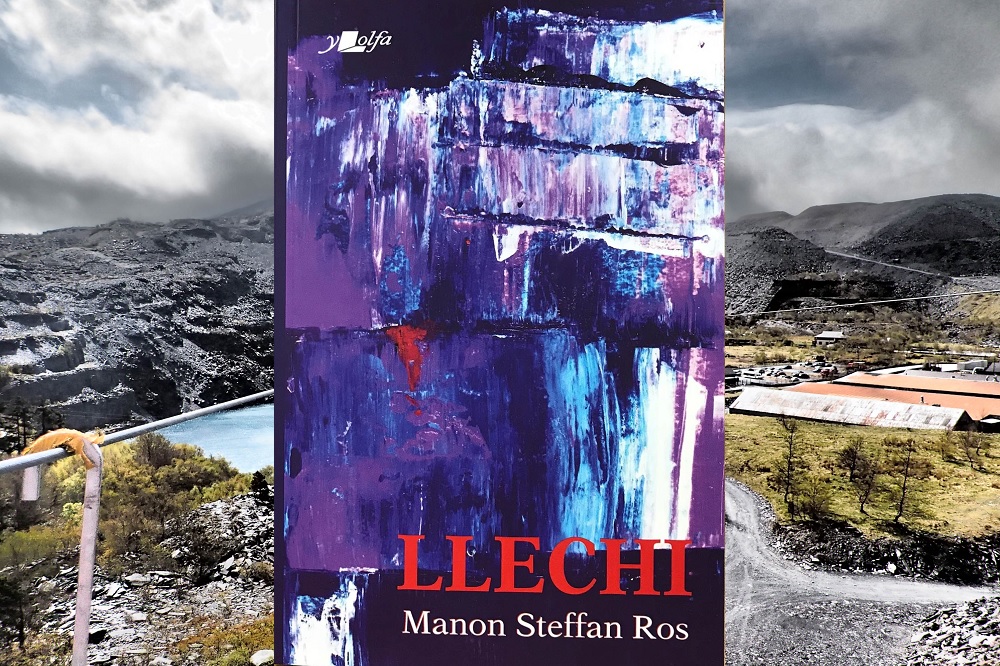Review: Llechi is a masterclass of exposition written by an author at the peak of her powers

Alun Davies
Penrhyn Quarry in Gwynedd was at one time the largest slate quarry in the world. At its peak, nearly three thousand quarrymen risked life and limb to extract the famous purple slate for export across the globe, and it also became known as the epicenter of the ‘Great Strike’, the longest industrial dispute in British history.
However, as time wore on, and slate became more cheaply available from other parts of the world, the quarry’s fortunes waned. It has changed hands many times but is still in operation today, albeit with a much-reduced workforce. An abandoned part of the quarry is now home to Britain’s third longest zip line.
Manon Steffan Ros’ latest novel Llechi (‘Slates’) is set in and around Bethesda, a town that was built on the slate industry, and the book, like the town, lives in the shadow of Penrhyn Quarry. It is the nucleus around which the story revolves, a place where we find ourselves returning, again and again, to sit in the sea of warm, smooth slates.
It is where two local teenagers, Gwenno and Shane, spend time together, eating Haribo and watching people throw themselves down the zip wire suspended overhead. It is where Gwenno reveals to Shane the secrets that torment her seemingly perfect life. And it is where, at the beginning of the novel, Gwenno’s body is found, murdered and abandoned.
Llechi is told from the perspective of Shane, a seemingly ordinary teenager who finds himself thrown into an extraordinary situation by the discovery of his friend’s body and the events leading up to it. Through Shane’s eyes we see the impact of the murder on his friends, on their parents, and on the community at large. The police and the media descend on the town and particularly on the school, trying to unpick every part of Gwenno’s life. Was she really the angel that everyone thought she was – the blonde-haired, blue-eyed girl living a privileged life in a grand farmhouse with a successful father and popular mother?
As with most teenagers, it is Gwenno’s group of friends who know her best – Keira, at whose house she spends much of her time; Siwan, the middle-class girl who is slightly jealous of the prettier, cleverer Gwenno; Llyr, the naive, innocent boy with a crush on her, and Dion, the tough guy of the group, loyal and street-wise. And of course, there is Shane, Gwenno’s confidant, who chooses when and if to reveal her secrets to his friends, to the police, or to us the reader.
Gripping
As an example of the art of storytelling, Llechi is a masterclass of exposition – the concept that Chekov explained as ‘Don’t tell me the moon is shining; show me the glint of light on broken glass’, or more simply put, ‘Show, don’t tell’. Gwenno is dead before the book starts, but as the story progresses we build up a clear picture of her and the events leading to her demise, as Shane provides us with snatches of memories from the quarry and parents evening at the school.
We listen in on conversations between the group of friends as they sit in a cafe, or drink late at night in the local park, remembering Gwenno and arguing over how much they should share with the police. We are drip-fed information, often at the most unexpected of times, and sometimes what we are given is conflicting – one minute a character is good, the next he is evil. This could make us question Shane as a narrator, until we realise that it is not the telling of Gwenno’s tale that is confusing, but rather the tale itself.
There are many themes running through Llechi – the nature of friendship, the abuse of power, the pursuit of revenge, the importance of asking for help – but to delve too deeply into any of these would be to divulge too much of the carefully crafted plot.
Instead, I will conclude by saying that Llechi is an excellent, gripping novel written by an author at the peak of her powers – but it is also so much more than that. Often the memory of a story will begin to evaporate as soon as you close the cover for the final time and move on. That is not the case with Llechi. It is that rarest of things, an unforgettable novel, telling a story that will stay with you for a long time – or, as Chekov might have put it, ‘Some day the quarry will close forever, but the slate will always remain.’
Support our Nation today
For the price of a cup of coffee a month you can help us create an independent, not-for-profit, national news service for the people of Wales, by the people of Wales.






